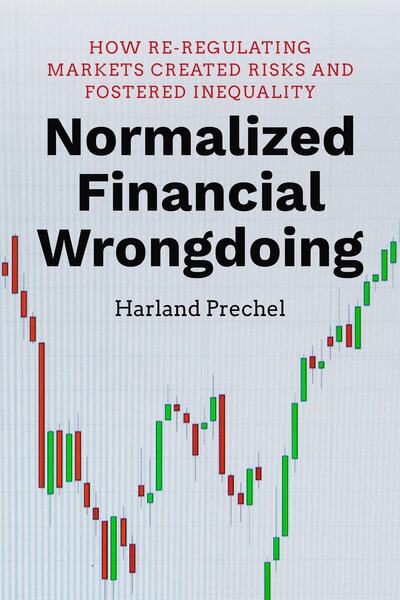
2020
384 pages.
from $32.00
Paperback now $16.00 (50% off)
Hardcover ISBN: 9781503602380
Paperback ISBN: 9781503614451
Ebook ISBN: 9781503614468
Winner of the 2022 MSS Distinguished Book Award, sponsored by the Midwest Sociological Society.
In Normalized Financial Wrongdoing, Harland Prechel examines how social structural arrangements that extended corporate property rights and increased managerial control opened the door for misconduct and, ultimately, the 2008 financial crisis. Beginning his analysis with the financialization of the home-mortgage market in the 1930s, Prechel shows how pervasive these arrangements had become by the end of the century, when the bank and energy sectors developed political strategies to participate in financial markets. His account adopts a multilevel approach that considers the political and legal landscapes in which corporations are embedded to answer two questions: how did banks and financial firms transition from being providers of capital to financial market actors? Second, how did new organizational structures cause market participants to engage in high-risk activities? After careful historical analysis, Prechel examines how organizational and political-legal arrangements contribute to current record-high income and wealth inequality, and considers societal preconditions for change.
About the author
Harland Prechel is Professor of Sociology and Liberal Arts Cornerstone Fellow and Energy Institute Fellow at Texas A&M University. He is the author of Big Business and the State (2000).
"This book offers a theoretically sophisticated, empirically rich explanation of how financialization was politically created in the United States beginning in the 1980s, and how it has increased inequality. Prechel takes us inside corporations to see how financial capitalists leveraged control over organizations to enhance their power or government and thereby enrich themselves at the expense of everyone else including other fractions of capital."
—Richard Lachmann, University at Albany, State University of New York
"A must-read for anyone wishing to understand the foundations of contemporary capitalism. It draws on quantitative analysis, in-depth case studies, and trenchant historical analysis to uncover the class conflicts and structural dynamics that have given rise to the modern financial system, which to so many people's dismay has proven prone to periodic crisis."
—Donald Palmer, University of California, Davis
"This important study looks at changes in corporate–state relations and changes inside the corporation to find the origins of corporate malfeasance. As corporations layered up more complex ownership structures, opportunities opened for behavior that precipitated the Great Financial Crisis. Prechel grounds his analysis in larger changes in U.S. society that have contributed to disastrous social inequality."
—Terrence McDonough, National University of Ireland Galway